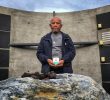Cross bordering
In 2001, Sanchez worked in Kuwait as a service crew paid with P18,000 ($375.74).
After three years, he grabbed the offer of his employer, Al Homaizi Food Stop Company, to work in Iraq. Though the workplace is dangerous, workers were promised twice their wages in Kuwait. But Sanchez said they were told that the company has no liability if something happened to them. They did not have hazard pay as well, he said. �Pag may namatay, may media blackout�(There�smediablackout whenever someone dies).
And even if at that time a deployment ban was imposed by the Philippine government, and OFWs� passports have �cannot travel to Iraq� remarks, Sanchez said this was not really implemented.
�Di totoo �yun. Publicity lang �yun� (That was never for real. That was only for publicity), he said, citing the cases of many Filipinos crossing from Kuwait to Iraq to work in military camps there. He added that Filipinos from Saudi Arabia, Qatar and Jordan also crossed to Iraq.
Workers being deployed in military camps in Iraq are brought there aboard coasters in a convoy with American soldier escorts. The convoy carries the camps� supply.
They would spend overnights in �green zones� or relatively safer areas when their way is being cleared by an advance military team. At times when the convoys are being bombed, they would only be asked to lay down.
When a vehicle is hit, Sanchez said the soldiers would only get the bodies and blow up the vehicle so that it could no longer be used by their enemy.
Sanchez�s team spent a night in Scania, a green zone. They would only sleep on cartons, with only jackets as their blankets. He estimated they were about a hundred Filipinos in their batch alone that crossed to Iraq.
Camp Taji
Sanchez was deployed by his employer in their post in Camp Taji. Al-Taji airfield was originally an Iraqi Republican Guard base during the Saddam era. It was once a center for the manufacture of chemical weapons. Taji was also the largest tank maintenance facility in Iraq.
The base came under United States control following the 2003 Invasion of Iraq, also known as “Operation Iraqi Freedom.” Of some 106 bases used by the United States in Iraq, Camp Taji is considered one of 14 “enduring” bases.
Sanchez and other Filipinos working in the same company were staying only in a tent, sleep on a folding bed, and use a portable toilet. But the American soldiers stay in improvised cargo vans.
He could not sleep for the first few days. At night when they could hear and feel the bombings, and the alarm detected a mortar, they would run to the bunker with their bottled water. They would spend an hour, or even the whole night, inside the bunker. During these times, food shops and mess hall, Internet and phone booths are closed.
The closest bombing he has experienced was less than 500 meters from their tent.
�Napabalikwas ako, tayo talaga ako, bitbit ko agad tubig ko� (I was roused and I jumped for safety bringing my water), he recalled, adding that compact food or power bars serve as their meal inside the bunker.
Filipinos are present anywhere in the camp: in the mess hall, computer shops, food stalls, utility service. He denied seeing Amb. Roy Cimatu or Philippine officials in Iraq at the time of the invasion.
Pinoy Life Abroad









